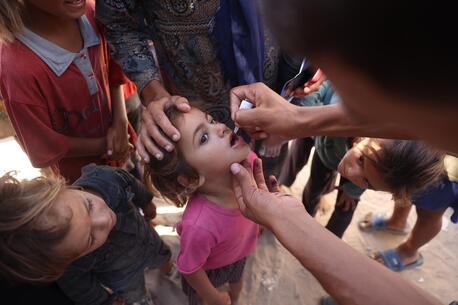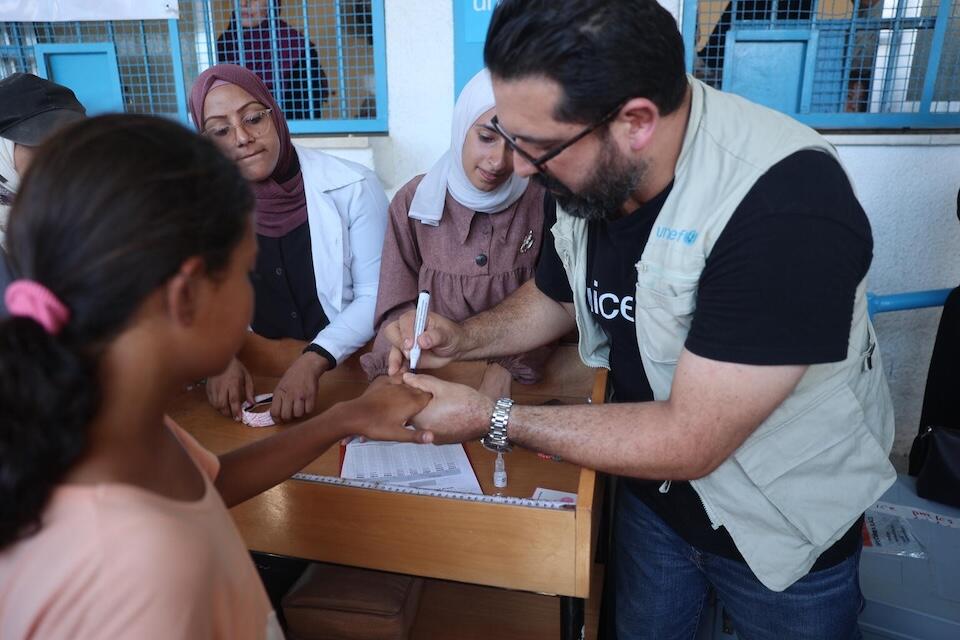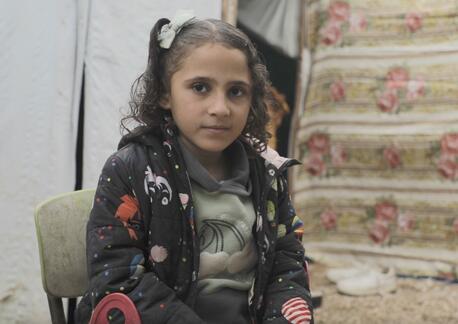
Polio Vaccines Protect Children in Gaza Strip
Polio vaccination teams successfully reached more than half a million children in Gaza during Round One of an ambitious campaign. Parents "know there is no time to waste to protect their children," said Adele Khodr, UNICEF Regional Director for the Middle East and North Africa.
Target reached in first round of polio vaccination campaign
Around 90 percent of children under 10 in the Gaza Strip have received a dose of the polio vaccine following the first round of an emergency vaccination campaign conducted by UNICEF and partners in early September 2024.
In August, an unvaccinated 11-month-old boy was confirmed to be partially paralyzed by polio, the first case in Gaza in 25 years. By May 2024, 60 percent of Gaza's water and sanitation infrastructure had been destroyed or severely damaged and nearly 2 million people were displaced and living in overcrowded conditions, setting the stage for a massive public health crisis.
Despite the war, the long distance and the bombing, I am determined to vaccinate my children. — Fatima, mother of two
In Deir al-Balah, central Gaza Strip, Fatima, mother of 4-year-old Adam and his baby sister, Majd, was one of many parents who flocked to health facilities to ensure their children received the novel oral polio vaccine type 2 (nOPV2) to protect them from the highly contagious, crippling disease.
"The place is quite far, but my son desperately needs it as he has no immunity," Fatima said. "Despite the war, the long distance and the bombing, I am determined to vaccinate my children."
Watch the video:
Families made the effort to turn out in high numbers
During the 12-day campaign, mobile and transit teams actively reached out to families living in shelter homes, tents and camps for the displaced, alongside community workers engaging families to raise awareness about the vaccination campaign.
“Despite relentless attacks on schools and sites sheltering uprooted children, exhausting displacement orders forcing families to relocate time and again, and widespread hunger levels that have at points pushed parts of Gaza to the brink of famine, families made the effort to turn out in high numbers to the vaccination sites," said Adele Khodr, UNICEF Regional Director for the Middle East and North Africa. "They know there is no time to waste to protect their children."

Humanitarian pauses vital to the success of the vaccination campaign
Laying the groundwork for the campaign included the implementation of area-specific humanitarian pauses to ensure the safety of children and health care workers.
“Preparing for this ambitious campaign and securing these pauses was not easy but it demonstrates that it is possible to allow supplies into the Strip, silence the strikes and protect civilians," Khodr continued. "There just has to be the will."
The next step will be to ensure that hundreds of thousands of children receive a second dose of the polio vaccine later this month.
Wherever children are in need, UNICEF is there to help. Your contribution can make a difference. Please donate today.
HOW TO HELP
There are many ways to make a difference
War, famine, poverty, natural disasters — threats to the world's children keep coming. But UNICEF won't stop working to keep children healthy and safe.
UNICEF works in over 190 countries and territories — more places than any other children's organization. UNICEF has the world's largest humanitarian warehouse and, when disaster strikes, can get supplies almost anywhere within 72 hours. Constantly innovating, always advocating for a better world for children, UNICEF works to ensure that every child can grow up healthy, educated, protected and respected.
Would you like to help give all children the opportunity to reach their full potential? There are many ways to get involved.





